PENGUIN  CLASSICS
CLASSICS
HILDEGARD OF BINGEN: SELECTED WRITINGS
HILDEGARD OF BINGEN was born into a noble family in Bermersheim in 1098. At the age of eight her family gave her into the care of a religious noblewoman, Jutta of Spanheim, who took Hildegard with her to become a recluse at the Disibodenberg monastery. Some time between 1112 and 1115, when the monastery became a convent, Hildegard took religious vows.
After Juttas death in 1136, Hildegard was elected abbess at Disibodenberg. At this time she started to write about the visions she had been experiencing. Her first work, Scivias, appeared with Papal approval in 1151, just after she had established her own religious community at Rupertsberg, near Bingen. Her collection of religious songs, the Symphonia, appeared in 1158. She then produced a number of other works, including The Book of Lifes Merits(c. 1163),The Book of Divine Works(c. 113), lives of local saints, and various musical, scientific and medical works. She also invented a private language, which formed the basis of two short works, The Unknown Language and The Unknown Alphabet (both completed by 1158). Hildegard was by this time regarded as a mystic and prophetess, and she came to be known as the Sibyl of the Rhine. In about 1158 she undertook the first of her preaching tours throughout Germany, a very unusual venture for a medieval abbess. This was followed by three further tours in 1160, 11613 and 117071. She founded a second monastery at Eibingen in 1165.
Hildegard died in 1179. She was celebrated as a saint in the Rhineland and in the fifteenth century her feast day was established as 17 September.
MARK ATHERTON studied modern languages at Oxford. He trained as a teacher at Bangor and in medieval studies at York, where he completed a doctorate on the linguist and philologist Henry Sweet. He has taught English language, literature and translation at universities in Cologne and Brussels, and researched and published mainly on early medieval literature. After a period as research associate in Anglo-Saxon studies at the University of Manchester, he is now fellow of the Centre for the Study of Christianity and Culture, Regents Park College, Oxford.
Hildegard of Bingen
SELECTED WRITINGS
Translated with an introduction and notes by
MARK ATHERTON
PENGUIN BOOKS
PENGUIN BOOKS
Published by the Penguin Group
Penguin Books Ltd, 80 Strand, London WC2R 0RL, England
Penguin Putnam Inc., 375 Hudson Street, New York, New York 10014, USA
Penguin Books Australia Ltd, 250 Camberwell Road, Camberwell, Victoria 3124, Australia
Penguin Books Canada Ltd, 10 Alcorn Avenue, Toronto, Ontario, Canada M4V 3B2
Penguin Books India (P) Ltd, 11 Community Centre, Panchsheel Park, New Delhi 110 017, India
Penguin Books (NZ) Ltd, Cnr Rosedale and Airborne Roads, Albany, Auckland, New Zealand
Penguin Books (South Africa) (Pty) Ltd, 24 Sturdee Avenue, Rosebank 2196, South Africa
Penguin Books Ltd, Registered Offices: 80 Strand, London WC2R 0RL, England
www.penguin.com
This translation first published in Penguin Books 2001
Translation and editorial matter copyright Mark Atherton, 2001
All rights reserved
The moral right of the editor has been asserted
Except in the United States of America, this book is sold subject to the condition that it shall not, by way of trade or otherwise, be lent, re-sold, hired out, or otherwise circulated without the publishers prior consent in any form of binding or cover other than that in which it is published and without a similar condition including this condition being imposed on the subsequent purchaser
ISBN: 978-0-14-196004-3
CONTENTS
INTRODUCTION
I. LIFE AND CAREER
1. The making of a writer
In 1146, an unknown and unpublished author, abbess of a small convent of nuns attached to the larger monastery of Disibodenberg in the Rhineland, sent a letter to the great churchman of her day, Bernard of Clairvaux. In her opening words, she emphasized Bernards fame and her own unworthiness, before moving to her reason for writing. Despite her lack of education, the writer of the letter claimed she was filled with sophisticated and far-reaching theological visions and interpretations of the Bible. At the same time she also revealed that she was composing elaborate songs and music for use in church, again without having had any specific training. But worried about pride and presumption she was plagued with afflictions and doubts. Should she, a mere nun and uneducated woman, continue in such potentially reckless and inappropriate activities? The concluding request of her letter is couched in language and rhetoric the like of which Bernard had almost certainly never seen or heard before. Hildegard appeals to him in a series of injunctions, some conventional, others highly original. She entreats him not only by the brightness of the Father, by his wonderful Word, a familiar idea, but also by the sacred sound through which all creation resounds, a more unusual concept; and perhaps even more startling, by the Word from which all the world was created, by the height of the Father who through the sweet power of green vigour sent the Word to the Virgins womb where it took on flesh like the honey in the honeycomb.
What does she mean by some of these unusual ideas? The sacred sound implies an idea of music as the essential fabric of the cosmos. There is a whole world of ideas behind this one phrase. The expression green vigour, or viriditas in the Latin of the original text, is similarly rich in connotations. For Hildegard, greenness means the force which gives life to the body and renewal in nature; in a religious sense it signifies both the power of the Spirit at work in the world and the moral force that gives life and fruitfulness to human actions.
With hindsight, we can see the significance of such metaphors and concepts; they are the first expressions in writing of a new religious thinker who already at the time of writing has her own theology. Behind the final phrases of the letter to Bernard we detect a musician with her own philosophy of music, and an artist who though no classical stylist was a maker of fresh and startling images and ideas. Moreover, all this was expressed in a rough, unpolished Latin which Hildegard had acquired without formal study while singing the psalms and prayers of the monastic services in the daily life of her convent. Bernard was evidently impressed, for his short reply was positive. Which is somewhat surprising, given that he was a churchman of the twelfth century, a period in which anything new and strange in religion was probed carefully for heresy. And Bernard was no liberal in such matters: he had secured the prohibition of the teachings of the great Paris philosopher Peter Abelard and his supporter Arnold of Brescia, and at the time of Hildegards letter he was also agitating (unsuccessfully in this case) for the condemnation of the doctrines of Gilbert of Poitiers, a theologian who had made some unorthodox statements on the unity of the godhead. But at the Synod of Trier in the winter of 11478, Hildegards work in progress (possibly some sections of part II of her Scivias) was read out with interest by Pope Eugenius III and others. Bernard spoke in her favour, and papal approval was given for its publication.
Within a few years, Hildegard of Bingen had become a religious, moral and political adviser to half of Europe, as her voluminous correspondence shows. Credited with prophetic insights, the Sibyl of the Rhine was frequently consulted, and on the basis of her authority as a prophet, undertook what for a woman was almost unheard of: four In true Gregorian reformist manner, she called for the clerics to end their neglect of the Church, to lead celibate lives and to stop chasing after preferments.

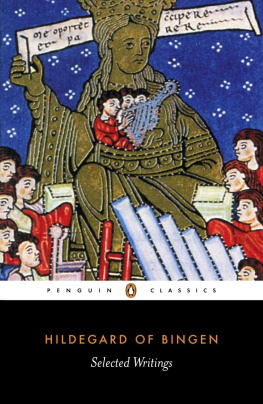
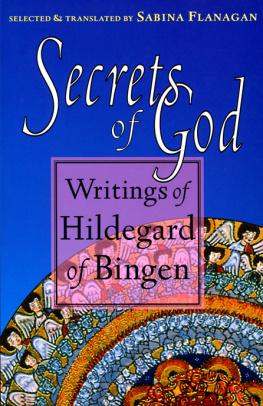
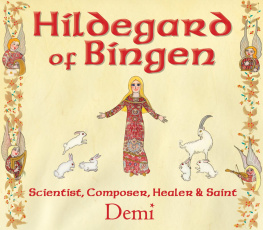

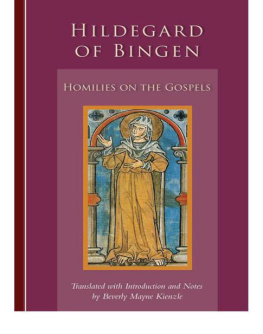
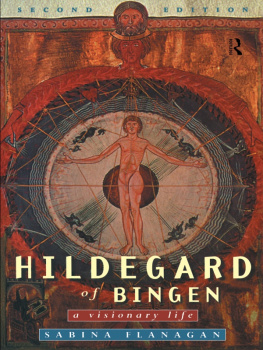

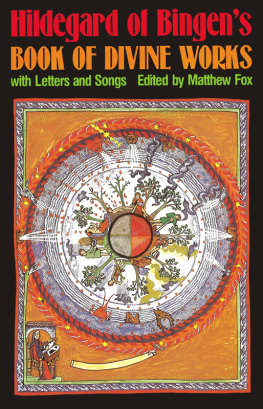
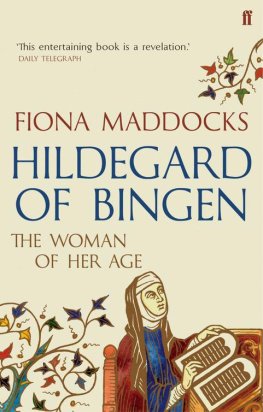

 CLASSICS
CLASSICS